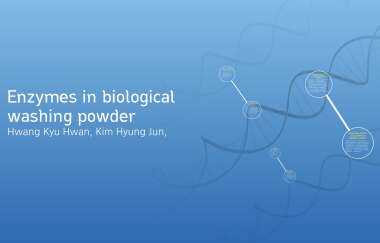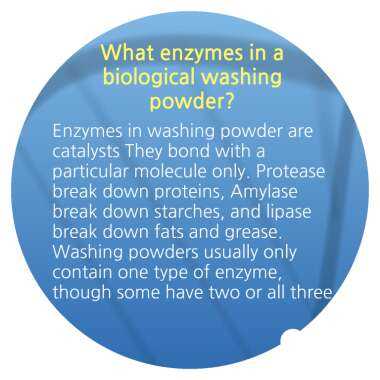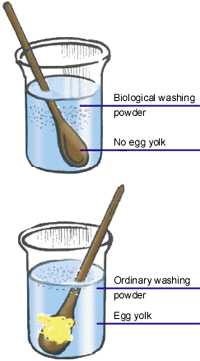




When it comes to doing laundry, we all want clothes that are not only clean but also effectively rid of tough stains and odours. That’s where the power of biological washing powder comes in. This special type of detergent contains key enzymes that go beyond traditional cleaning agents to break down and remove even the most stubborn dirt, grease, and grime.
The main advantage of biological washing powder lies in its use of enzymes. Enzymes are natural proteins that act as catalysts, speeding up chemical reactions. In the context of laundry detergent, these enzymes target specific types of stains and help to break them down by breaking up their molecular structure.
There are several key enzymes commonly found in biological washing powder. One of the most important is protease, which targets protein-based stains such as blood, grass, and food. By breaking down the proteins in these stains, protease helps to lift and remove them from the fabric.
Lipase is another key enzyme found in biological washing powder. This enzyme is specifically designed to tackle oily or greasy stains, such as those caused by butter, oil, or makeup. Lipase breaks down the fats and oils in these stains, allowing them to be easily washed away during the cleaning process.
In addition to protease and lipase, amylase is another enzyme that is commonly included in biological washing powder. Amylase targets starch-based stains, which are often found in foods like pasta, rice, and potatoes. By breaking down the starch molecules in these stains, amylase helps to remove them from the fabric, leaving it clean and fresh.
So, the next time you’re faced with a pile of dirty laundry, consider the power of biological washing powder and its key enzymes. Not only will it help to remove tough stains and odours, but it will also leave your clothes looking and smelling their best.
Understanding the Power of Enzymes in Biological Washing Powder
What are Enzymes?
Enzymes are biological molecules that act as catalysts in various chemical reactions in living organisms. They are typically proteins that speed up the rate of a specific chemical reaction without being consumed in the process. In the context of biological washing powder, enzymes play a crucial role in enhancing its cleaning power.
How do Enzymes Work in Biological Washing Powder?
The enzymes present in biological washing powder target various types of stains and dirt commonly found on clothes. Each enzyme is specialized to break down a particular type of stain, enabling more efficient removal during the washing process.
For example:
- Proteases break down protein-based stains such as blood, sweat, and grass.
- Amylases break down starch-based stains like chocolate and tomato sauce.
- Lipases break down fat and oil stains.
When the biological washing powder containing these enzymes is added to the wash, the enzymes get to work by breaking down the stains into smaller, soluble substances that can be easily rinsed away. This results in cleaner and fresher clothes.
Why are Enzymes Effective in Cleaning?
Enzymes are highly effective in cleaning because they are able to target specific types of stains and break them down at a molecular level. They are able to reach and remove stains that regular detergents may struggle to fully eliminate.
Furthermore, enzymes are more sustainable than traditional chemical-based cleaning agents. They are derived from natural sources, such as bacteria and fungi, and are biodegradable. This makes biological washing powders with enzymes a more environmentally friendly option.
Conclusion
The power of enzymes in biological washing powder lies in their ability to target specific types of stains and break them down at a molecular level. By harnessing the power of specialized enzymes, biological washing powders can provide more efficient and effective cleaning results, while also being environmentally friendly. So next time you do your laundry, consider the benefits of using a biological washing powder with enzymes.
Unveiling the Secrets of Biological Washing Powder
Biological washing powders have been a staple in households around the world for decades. They offer enhanced cleaning power, especially when it comes to tackling tough stains and odors. But have you ever wondered what makes them so effective? In this article, we will delve into the secrets of biological washing powder and uncover the key enzymes that enhance its cleaning power.
Enzymes: Nature’s Cleaning Agents
Enzymes are naturally occurring molecules that act as catalysts in biological processes. In the case of biological washing powder, specific enzymes are included to help break down complex stains and dirt molecules, making them easier to remove.
There are several key enzymes found in most biological washing powders:
- Protease: This enzyme breaks down proteins, which are often found in food stains like grass, blood, and egg.
- Amylase: Amylase targets starches, such as those found in pasta, rice, and potatoes.
- Lipase: Lipase is effective against oily stains and grease, typically found in butter, oil, and sauces.
These enzymes work together to tackle a wide range of stains, ensuring that your laundry comes out fresh and clean.
How Enzymes Work
Enzymes speed up chemical reactions by breaking down complex molecules into smaller, more manageable pieces. They do this by binding to the target molecule and altering its structure, making it easier for other cleaning agents, like surfactants, to lift the stain away from fabric.
Each enzyme has a specific target and thrives under certain conditions. For example, proteases work best in warm water, while amylases perform well in cooler temperatures. This is why it’s important to follow the manufacturer’s instructions and wash your laundry at the recommended temperature to maximize the enzyme’s effectiveness.
The Benefits of Biological Washing Powder
Biological washing powders offer several advantages over their non-biological counterparts. Here are some of the key benefits:
- Improved stain removal: The enzymes in biological washing powder excel at breaking down tough stains, giving you cleaner, fresher laundry.
- Effective at lower temperatures: Biological washing powders are designed to be effective even in cooler water, reducing energy consumption and helping the environment.
- Fresher smelling laundry: By targeting odorous substances, such as sweat and food residues, biological washing powders can leave your laundry smelling clean and fresh.
Overall, biological washing powder offers superior cleaning power, making it a popular choice for many households.
| Advantages | Disadvantages |
|---|---|
|
|
Remember to always follow the manufacturer’s instructions when using any washing powder, including biological ones, to ensure optimal results and caring for your clothes.
The Role of Enzymes in Cleaning Clothes
When it comes to cleaning clothes, enzymes play a crucial role in enhancing the cleaning power of biological washing powders. These powders are specifically designed to remove tough stains and dirt from garments, and enzymes are the key ingredients that make them effective.
What are Enzymes?
Enzymes are bioactive substances that act as catalysts in various biological processes. They are naturally occurring proteins produced by living organisms, such as bacteria and fungi. In the context of cleaning clothes, enzymes work by breaking down complex stains into smaller, more soluble compounds, making it easier for the washing powder to remove them.
The Types of Enzymes in Biological Washing Powders

There are several types of enzymes commonly found in biological washing powders, each with a specific role in targeting different types of stains:
- Protease: This enzyme is responsible for breaking down protein-based stains, such as blood, grass, and egg stains. It helps to break down the proteins in these stains into smaller molecules, making them easier to remove.
- Amylase: Amylase is an enzyme that targets starch-based stains, such as pasta sauce and gravy. It breaks down the complex starch molecules into simpler sugars, allowing the washing powder to effectively lift and remove the stains.
- Lipase: Lipase is an enzyme that specifically targets fatty stains, such as oil and grease. It breaks down the fats into smaller fatty acids, which can then be easily washed away.
How Enzymes Enhance Cleaning Power
The use of enzymes in biological washing powders offers several advantages when it comes to cleaning clothes:
- More Effective Stain Removal: Enzymes have the ability to break down complex stains into smaller, more soluble compounds. This makes it easier for the washing powder to penetrate and remove the stains, resulting in cleaner and brighter clothes.
- Lower Temperature Washing: Enzymes are highly effective at lower temperatures, which means that biological washing powders can deliver excellent cleaning results even in cold water. This not only saves energy but also helps to preserve the colors and integrity of the garments.
- Environmentally Friendly: As enzymes are biodegradable, the use of biological washing powders can be considered more environmentally friendly compared to traditional detergent formulations. They break down naturally in the environment, reducing their impact on water systems and ecosystems.
Conclusion
Enzymes play a crucial role in enhancing the cleaning power of biological washing powders. They break down complex stains, making them easier to remove, and offer several advantages such as more effective stain removal, lower temperature washing, and environmental friendliness. These enzymes have revolutionized the way we clean clothes and have become an integral part of modern laundry cleaning.
Lipase: The Key to Breaking Down Stubborn Stains
Lipase is one of the key enzymes found in biological washing powders that help enhance their cleaning power. This enzyme plays a crucial role in breaking down stubborn stains, especially those caused by fats, oils, and grease.
When it comes to doing laundry, stains caused by lipids can be particularly challenging to remove. Lipids, which include oils, fats, and greases, have a complex chemical structure that makes them insoluble in water. This means that traditional detergents alone may not be able to effectively remove these types of stains.
That’s where lipase comes in. This powerful enzyme targets and breaks down the lipid molecules, making them soluble in water and easier to remove from fabric fibers. Lipase achieves this by catalyzing a hydrolase reaction, which involves breaking the ester bond in lipids.
One of the reasons why lipase is so effective in removing stubborn stains is because it is produced naturally by organisms that thrive in environments rich in lipids, such as the human digestive system. These organisms have evolved lipase as an essential tool for breaking down dietary fats and facilitating their absorption.
In the context of laundry detergents, lipase is typically derived from microbial sources, such as bacteria or fungi. These microorganisms produce lipase as part of their natural metabolic processes. By harnessing lipase from these sources, cleaning product manufacturers can formulate laundry detergents that are highly effective in removing even the toughest stains.
It’s important to note that lipase is just one of the enzymes found in biological washing powders, which also commonly include amylase, protease, and cellulase. Each of these enzymes has its unique role in enhancing the cleaning power of the detergent.
In summary, lipase is a key enzyme found in biological washing powders that play a crucial role in breaking down stubborn stains caused by lipids. By harnessing the power of lipase, detergent manufacturers can formulate products that are highly effective in removing even the toughest stains, resulting in cleaner and fresher laundry.
Protease: Unleashing the Power to Remove Protein-based Stains

Protease is a key enzyme found in biological washing powders that plays a vital role in enhancing the cleaning power. It is particularly effective in removing protein-based stains, such as blood, sweat, grass, and food stains.
How does it work?
Protease works by breaking down the complex protein molecules present in stains into smaller, more easily soluble fragments. This enzymatic action helps to loosen and lift the protein-based stains from the fabric fibers, allowing them to be washed away more effectively.
Benefits of using protease:
- Highly effective: Protease is specifically designed to target and break down protein-based stains, making it highly effective in removing them from clothing.
- Improved stain removal: The enzymatic action of protease helps to improve the removal of protein-based stains, ensuring that they are lifted away during the wash cycle.
- Preserves fabric quality: Unlike harsh chemicals, protease is mild on fabrics and does not cause damage or fading. This helps to preserve the quality and lifespan of your clothing.
- Environmentally friendly: Protease is a natural enzyme derived from living organisms, making it a more sustainable and environmentally friendly alternative to chemical-based stain removers.
Usage recommendations:
- Check the care label of your garments to ensure they can be washed with biological washing powder containing protease.
- Separate heavily stained items from lightly soiled ones to optimize stain removal.
- Follow the instructions on the packaging for the recommended dosage of biological washing powder.
- Choose a suitable wash cycle and water temperature for the type of fabric and stains being treated.
- For tough stains, pretreat the affected area with a small amount of concentrated biological washing powder paste containing protease before washing.
Conclusion:
Protease is a powerful enzyme that plays a crucial role in removing protein-based stains from clothing. Its enzymatic action breaks down complex proteins, allowing them to be easily washed away. By using biological washing powders containing protease, you can achieve cleaner, stain-free clothes while also being kinder to the environment.
Amylase: Tackling Starchy and Carbohydrate Stains with Ease
Amylase is one of the key enzymes found in biological washing powder, which plays a crucial role in enhancing the cleaning power of the detergent. It is particularly effective in tackling starchy and carbohydrate stains, making it an essential component in any laundry detergent.
How Does Amylase Work?
Amylase is a type of enzyme that is naturally found in our bodies and in many living organisms, including bacteria. Its primary function is to break down carbohydrates and starches into simpler sugars, which can then be easily digested and utilized by the body.
When it comes to removing starchy and carbohydrate stains, amylase works by breaking down the complex starch molecules present in these stains. It does this by targeting and hydrolyzing the glycosidic bonds that hold the starch molecules together. This process helps to break down the stains into smaller, more soluble fragments that can be easily washed away during the laundry cycle.
Why is Amylase Beneficial in Biological Washing Powder?
The presence of amylase in biological washing powder offers several advantages when it comes to stain removal:
- Efficient Stain Removal: Amylase is highly effective in breaking down starchy and carbohydrate stains, allowing the detergent to more effectively remove them from the fabric.
- Reduced Pre-treating: With the help of amylase, there is often no need for pre-treating heavily stained fabrics with additional stain removers, saving time and effort.
- Gentle on Fabrics: Unlike harsh chemical stain removers, amylase is gentle on fabrics, preventing potential damage or color fading.
Other Applications of Amylase

Amylase is not only useful for stain removal in laundry detergents, but it also has various other applications:
- Food Industry: Amylase is widely used in the food industry to break down starches into sugars, aiding in the production of various food products such as bread, beer, and yogurt.
- Pharmaceutical Industry: Amylase is also utilized in the pharmaceutical industry for its role in digesting starch molecules, assisting in various medical and diagnostic applications.
- Waste Management: The enzymatic activity of amylase is harnessed in some waste treatment processes to break down organic waste, reducing its volume and environmental impact.
Conclusion
Amylase is a crucial enzyme in biological washing powder, playing a vital role in tackling starchy and carbohydrate stains. Its ability to break down complex starch molecules makes it highly effective in stain removal, while also being gentle on fabrics. Additionally, amylase finds various applications in other industries, further highlighting its significance in enzymatic processes.
FAQ
What are enzymes?
Enzymes are proteins that act as catalysts in various biochemical reactions. They help break down complex molecules into smaller, more manageable substances.
What role do enzymes play in biological washing powder?
Enzymes in biological washing powder enhance the cleaning power by breaking down stains and dirt molecules that are difficult to remove with ordinary detergents. They target specific types of stains, such as protein-based or starch-based stains.
Which enzymes are commonly used in biological washing powder?
Commonly used enzymes in biological washing powder include proteases, amylases, and lipases. Proteases break down protein-based stains, amylases target starch-based stains, and lipases work on fatty stains.
How do enzymes enhance the cleaning power of washing powder?
Enzymes work by speeding up chemical reactions that break down complex stains into smaller, soluble molecules that can be easily washed away. This helps remove tough stains effectively and improves the overall cleaning performance of the washing powder.












